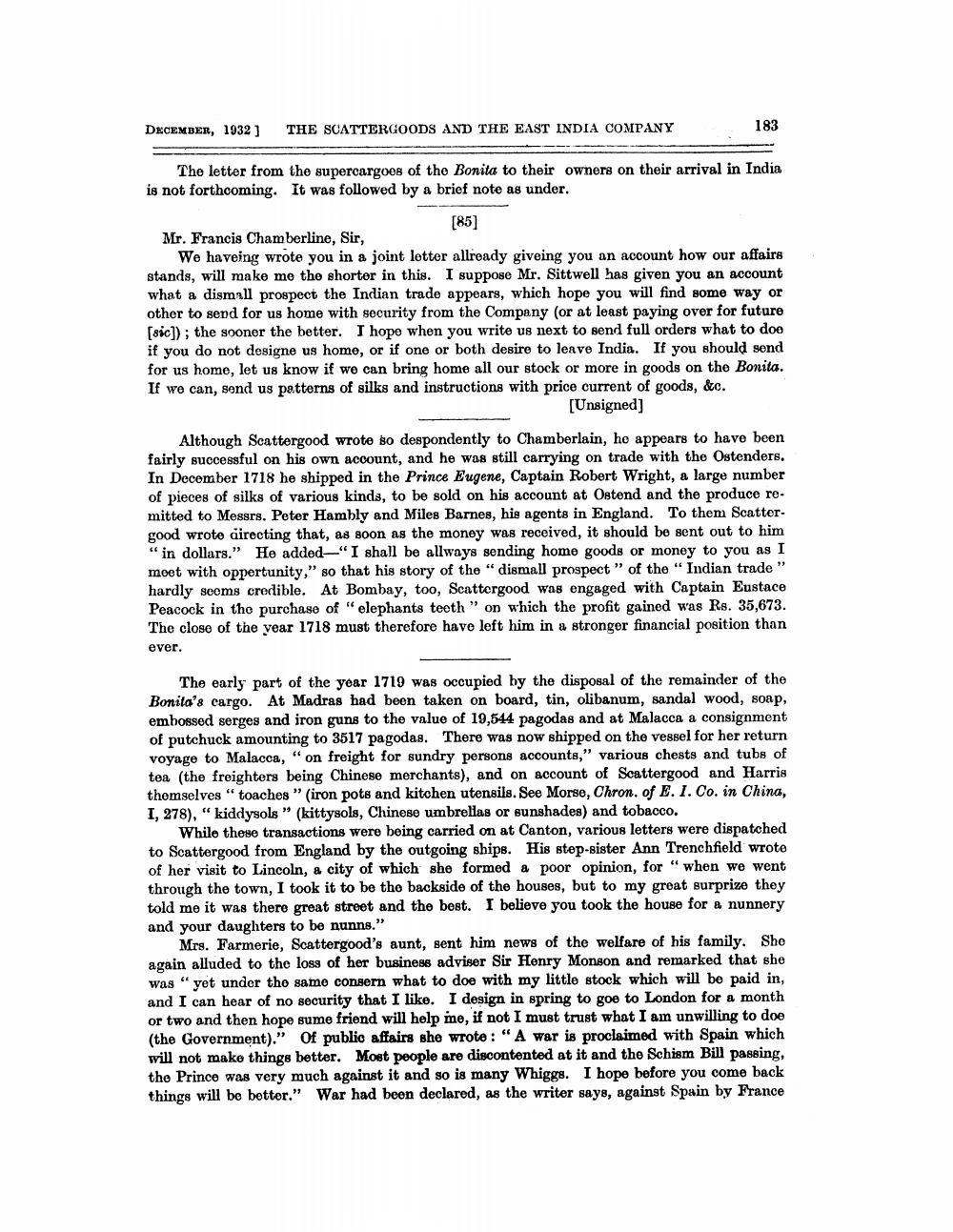________________
DECEMBER, 1932)
THE SCATTERGOODS AND THE EAST INDIA COMPANY
183
The letter from the supercargoes of the Bonita to their owners on their arrival in India is not forthcoming. It was followed by a brief note as under.
[85] Mr. Francis Chamberline, Sir,
We haveing wrote you in a joint letter allready giveing you an account how our affairs stands, will make me the shorter in this. I suppose Mr. Sittwell has given you an account what a dismall prospect the Indian trade appears, which hope you will find some way or other to send for us home with security from the Company (or at least paying over for future [sic]); the sooner the better. I hope when you write us next to send full orders what to doo if you do not designe us home, or if one or both desire to leave India. If you should send for us home, let us know if we can bring home all our stock or more in goods on the Bonita. If we can, send us patterns of silks and instructions with price current of goods, &c.
[Unsigned]
Although Scattergood wrote so despondently to Chamberlain, he appears to have been fairly successful on his own account, and he was still carrying on trade with the Ostenders, In December 1718 he shipped in the Prince Eugene, Captain Robert Wright, a large number of pieces of silks of various kinds, to be sold on his account at Ostend and the produce remitted to Messrs. Peter Hambly and Miles Barnes, his agents in England. To them Scatter. good wrote directing that, as soon as the money was received, it should be sent out to him "in dollars." He added—“I shall be allways sending home goods or money to you as I moet with oppertunity," so that his story of the " dismall prospect” of the "Indian trade” hardly seems credible. At Bombay, too, Scattergood was engaged with Captain Eustace Peacock in the purchase of " elephants teeth" on which the profit gained was Rs. 35,673. The close of the year 1718 must therefore have left him in a stronger financial position than ever.
The early part of the year 1719 was occupied by the disposal of the remainder of the Bonita': cargo. At Madras had been taken on board, tin, olibanum, sandal wood, soap, embossed serges and iron guns to the value of 19,544 pagodas and at Malacca a consignment of putchuck amounting to 3517 pagodas. There was now shipped on the vessel for her return voyage to Malacca, “on freight for sundry persons accounts," various chests and tubs of tea (the freighters being Chinese merchants), and on account of Scattergood and Harris themselves" toaches" (iron pots and kitchen utensils. See Morse, Chron. of E. 1. Co. in China, I, 278), "kiddysols” (kittysols, Chinese umbrellas or sunshades) and tobacco.
While these transactions were being carried on at Canton, various letters were dispatched to Scattergood from England by the outgoing ships. His step-sister Ann Trenchfield wrote of her visit to Lincoln, a city of which she formed a poor opinion, for "when we went through the town, I took it to be the backside of the houses, but to my great surprize they told me it was there great street and the best. I believe you took the house for a nunnery and your daughters to be nunns."
Mrs. Farmerie, Scattergood's aunt, sent him news of the welfare of his family. She again alluded to the loss of her business adviser Sir Henry Monson and remarked that she was " yet under tho samo consern what to doe with my little stock which will be paid in, and I can hear of no security that I like. I design in spring to goe to London for a month or two and then hope sume friend will help me, if not I must trust what I am unwilling to doe (the Government)." Of public affairs she wrote:"A war is proclaimed with Spain which will not make things better. Most people are discontented at it and the Schism Bill passing, the Prince was very much against it and so is many Whiggs. I hope before you come back things will be better." War had been declared, as the writer says, against Spain by France




